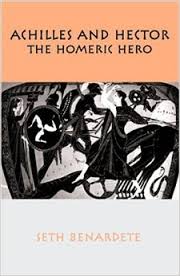"Achilles and Hector: The Homeric Hero," Ph.D. dissertation, University of Chicago: 1955. Reprinted in St. John's Review in two parts: Spring 1985: 31-58; Part II, Summer 1985: 85-114. Also published by St. Augustine's Press (2005) in cloth and paperback.
Seth Benardete’s study of the Iliad, which initiated his scholarly career, bears the hallmarks of the unique turn of mind that characterized all his later work. In a brief Note written thirty years later, included in this volume, he looks back on what he sees as the limits of his original reading of the Iliad. Yet he seems to have been aware of the fundamental problems from early on that he wrestled with explicitly when he returned to Homer some forty years later: the question of the relations among gods, fate, and human choice, which lies at the core of his late “Platonic reading” of the Odyssey, is already guiding his understanding of the Iliad. And he saw, in working out that understanding, how those relations take on a very distinct form for the tragic hero in contrast with the comic hero – Achilles in contrast with Odysseus.
Achilles and Hector: The Homeric Hero is divided into two parts, “Style” and “Plot.” In the first, Benardete examines the formulae Homer inherited from the poetic tradition, but only to demonstrate how Homer put them to work for deliberate purposes: in his search for those purposes, Benardete leads us to see how the supposedly conventional epithets and similes in fact open up key themes of the Iliad, including the crucial differences between men and heroes, Achaeans and Trojans, lineage and individual virtue. If the epithets were properly understood, Benardete suggests, however hesitantly, the plot of the Iliad would necessarily follow.
Turning to the plot, Benardete brings to light a pattern marked by three stages, in the course of which the motives of the Trojan War are transformed. While the war begins as a struggle for justice and vengeance, provoked by Helen, she unleashes something that goes beyond her – the love of fame or glory, in which heroic ambition finds its natural expression. A third stage is ushered in with Achilles’ choice to return to the war in order to avenge the death of Patroclus; this final development brings the motive of the action back to the personal, albeit on a different plane, which in some sense comprehends the first two stages. Benardete’s penetrating analysis uncovers, in the figure of Achilles, the paradigmatic Homeric hero, an increasingly complex character, who is haunted, in his grief at the loss of Patroclus, by his suspicion of the guilt he must assume for his death, which he tries to overcome in so many ineffective ways. It is only with his choice in the end to give back to Priam the corpse of Hector that the hero “rejoins the family of men.” In tracing this trajectory, Benardete discloses us what it means for the plot of the Iliad to be the tragedy of Achilles.
This volume is a reprint of Benardete’s Ph.D. dissertation, submitted in 1955 to the Committee on Social Thought at the University of Chicago and reprinted in two issues of the St. John’s Review of 1985.
Online:
Amazon
Free PDF - St. John's Review: Part 1 [pdf]
Free PDF - St. John's Review: Part 2 [pdf]

